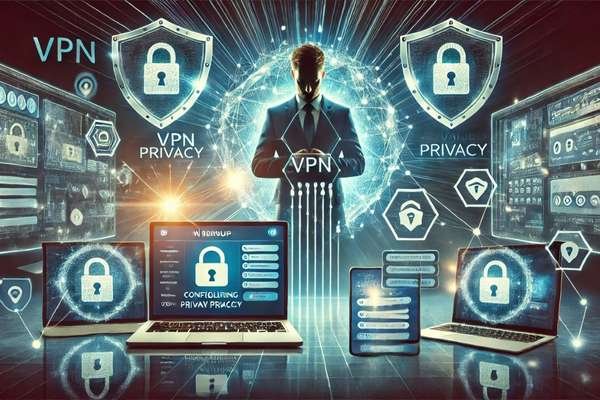
Why You Need a VPN for Secure Online Transactions
November 13, 2024
Speed vs Security Choosing the Best VPN Protocol
November 13, 2024How to Configure Your VPN for Maximum Privacy: Using a VPN (Virtual Private Network) is essential for online privacy, especially for professionals in digital marketing, development, and content creation who handle sensitive data daily. Configuring your VPN for optimal privacy doesn’t just shield your online activities; it safeguards client information, intellectual property, and your brand’s reputation. This article will guide you through configuring your VPN for maximum privacy with essential steps, insights, and FAQs to ensure you’re getting the most out of your VPN service.
Table of Contents
1. Understanding Why VPN Configuration Matters for Privacy
Configuring your VPN goes beyond simply installing and activating it. To truly safeguard your privacy, you need to understand the settings that protect your IP address, encrypt your data, and prevent leaks. Misconfigured VPNs can lead to data vulnerabilities and exposure to threats like IP leaks and DNS hijacking, which are detrimental to your security and privacy.
- IP Address Protection: Your IP address can reveal your location and identity. Proper VPN configuration masks this information.
- Data Encryption: By encrypting your data, a VPN protects it from cybercriminals and third-party snooping.
- Preventing Data Leaks: Misconfigured VPNs can cause DNS and WebRTC leaks, exposing your identity.
2. Choosing a VPN Provider Focused on Privacy
Before configuring a VPN, choosing a provider that prioritizes privacy is crucial. Not all VPNs offer the same security features, so look for:
- No-Log Policy: Choose a VPN provider that doesn’t keep logs of your activity.
- Kill Switch: This feature stops your internet connection if the VPN connection drops, preventing exposure.
- AES-256 Encryption: This is the gold standard for data security.
- Privacy-Friendly Jurisdiction: VPNs based in privacy-friendly countries (like Switzerland or Panama) are less likely to be subject to data retention laws.
Recommended Providers: ExpressVPN, NordVPN, CyberGhost. These providers are known for their robust privacy policies and advanced security features.
3. Configuring VPN Security Settings for Maximum Privacy
After choosing a VPN, configure the following settings to maximize your privacy:
3.1 Enable the Kill Switch
A kill switch is essential in cases where your VPN connection drops unexpectedly. This feature will automatically cut your internet connection to prevent unencrypted data from leaking.
- Go to the settings of your VPN application.
- Locate the Kill Switch option (may be called “Network Lock” on some VPNs).
- Toggle it on.
3.2 Set Up Protocols for Secure Connections
VPN protocols determine how data is transmitted. Some protocols prioritize speed, while others prioritize security. The most secure options include:
- OpenVPN: Known for its balance of security and speed, suitable for most users.
- WireGuard: Offers a high level of security with less impact on speed, ideal for heavy streaming or gaming.
- IKEv2/IPSec: Best for mobile devices due to stability during connection switches.
To set up:
- Access Protocol Settings within your VPN.
- Select OpenVPN or WireGuard for enhanced security.
3.3 Configure DNS Settings to Avoid DNS Leaks
DNS leaks occur when your device sends requests to an unsecured DNS server, exposing your browsing activity. Configuring custom DNS servers within your VPN can prevent this.
- Navigate to DNS Settings in your VPN app.
- Enable Custom DNS Servers.
- Add reputable DNS servers like 1.1.1.1 (Cloudflare) or 8.8.8.8 (Google DNS).
3.4 Enable Multi-Hop for Extra Layer of Privacy
Some VPNs offer multi-hop or double VPN features that route your connection through multiple servers for added security.
- Go to the Multi-Hop or Double VPN settings.
- Toggle it on if you want maximum anonymity (note: this may slow down connection speed).
4. Enhancing Privacy with Advanced VPN Features
For professionals handling sensitive information, these additional features enhance privacy:
4.1 Split Tunneling
Split tunneling lets you choose which applications or websites go through the VPN and which do not. For example, you might want to route only your work-related applications through the VPN.
- Open Split Tunneling settings.
- Select apps that require VPN protection and exclude non-essential ones.
4.2 Obfuscation Mode
This feature is especially useful in countries with VPN restrictions or for accessing content that is geographically restricted.
- Find Obfuscation settings (usually under advanced settings).
- Enable it to hide VPN usage.
4.3 Stealth Mode for Extra Security
Stealth mode makes your VPN traffic appear as regular internet traffic, bypassing censorship and firewall detection.
- Go to Advanced Security Settings.
- Toggle Stealth Mode on for increased privacy in restrictive environments.
5. Testing Your VPN Configuration
After setting up your VPN, test it to confirm there are no leaks or vulnerabilities. Here’s how:
5.1 Check for IP Leaks
- Disconnect from your VPN and note your IP address (use sites like WhatIsMyIP).
- Connect to your VPN and verify that your IP has changed.
5.2 Conduct a DNS Leak Test
- Use a DNS leak test tool like DNSLeakTest.
- Ensure the displayed DNS server matches your VPN’s location, not your ISP’s.
5.3 Test for WebRTC Leaks
- Visit BrowserLeaks while connected to your VPN.
- Ensure your real IP address isn’t exposed through WebRTC.
How to Configure Your VPN for Maximum Privacy Recap
| Feature | Description | Steps to Enable |
|---|---|---|
| Kill Switch | Ensures your internet connection is cut off if the VPN connection drops, preventing data exposure. | Open your VPN app settings and toggle the Kill Switch or Network Lock option. |
| Secure Protocols | Choose a protocol like OpenVPN or WireGuard for optimal speed and encryption. | Navigate to Protocol Settings in your VPN app and select a secure option like OpenVPN or WireGuard. |
| DNS Protection | Prevent DNS leaks by configuring your VPN to use secure DNS servers like 1.1.1.1 or 8.8.8.8. | Go to DNS Settings in your VPN app and configure secure custom DNS servers. |
| Multi-Hop | Adds an extra layer of privacy by routing your connection through multiple servers. | Locate the Multi-Hop or Double VPN option in your VPN app settings and enable it. |
| Split Tunneling | Allows you to choose which apps or websites use the VPN and which don’t. | Open Split Tunneling settings, then select apps or websites to route through the VPN. |
| Obfuscation Mode | Hides your VPN traffic, making it appear as regular internet traffic to bypass restrictions. | Enable Obfuscation in the advanced settings of your VPN app. |
| Stealth Mode | Masks your VPN usage entirely, making it ideal for restrictive environments. | Toggle Stealth Mode on in your VPN app’s advanced security settings. |
6. Frequently Asked Questions
Can my VPN protect me from hackers?
Yes, a properly configured VPN encrypts your data, making it difficult for hackers to intercept and read. However, it’s not foolproof and should be combined with other security measures.
Why do I need a kill switch?
A kill switch is essential because it prevents your data from being exposed in case your VPN connection drops. This is particularly important for professionals handling sensitive information.
Will configuring my VPN slow down my internet speed?
Yes, some configurations like multi-hop or high encryption protocols can slow down your connection slightly. Choosing a VPN with optimized servers and settings for your location can minimize this impact.
Conclusion
Configuring your VPN for maximum privacy is essential for professionals who rely on secure internet connections to handle sensitive tasks. By choosing a trustworthy VPN provider and optimizing your settings for privacy, you’re taking a significant step towards safeguarding your data. The outlined steps—setting up security protocols, enabling a kill switch, and conducting leak tests—can shield your online activity from prying eyes. Remember, privacy is an ongoing commitment, so make sure to stay updated with your VPN provider’s features and latest security advancements.








